Table of Contents
Ultimate Guide to Delta Airlines
Delta SkyMiles, the most profitable airline in the world. Despite its award program being known as Skypesos by the frequent flier community, I'm here to walk you thorough the in's and out's and how you can get the most out of this program.
Top 5 Takeaways
- Basic Economy: Delta basic economy is one of the most restrictive amongst the airlines in the country for frequent fliers. Unlike other airlines, basic economy doesn't accrue any SkyMiles, MQD, miles for Million Miler status, nor have SkyClub access even with credit cards and lounge memberships that are supposed to give you access. The fare class also doesn't allow for seat selection upon booking, even for a fee.
- Flash Sales: Delta often has flash sales that bring up the value of their SkyMiles. However, even with flash sales, business class on Delta often remain uncompetitive compared to other programs. Economy, on the other hand, can often times be incredibly lucrative in and be really cheap.
- Take Off 15: Delta credit cards (except the Amex Delta Blue) reduce Delta operated award prices by 15%.
- Companion Certificates: Both the personal and business Delta Platinum and Reserve credit cards give a companion certificate upon card renewal each year. This perk could give outsized value for card holders.
- MQD headstart: By holding 4 Delta personal or business platinum/reserve cards, you could earn 10,000 MQDs automatically each year (2500 MQD per card). This is enough for Delta Gold Medallion status, equivalent to SkyTeam Elite Plus. By product changing to Delta business or personal platinum cards and holding 4 of them, you could effectively buy Delta Gold Medallion status for $1400. This is not even including the 4 companion certificates and rideshare, delta stays, and resy credits you would receive for holding the cards.
Delta Hubs
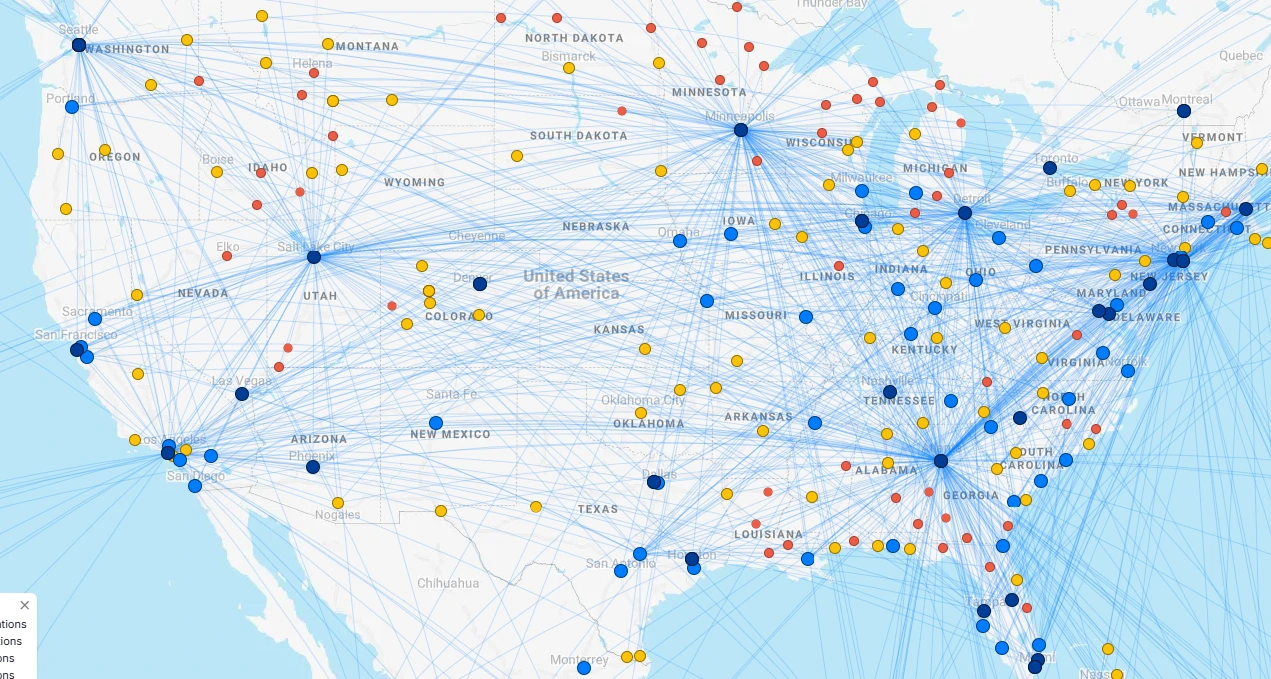
Delta has what I consider to be the most well rounded/best hubs. There are 2 hubs on each coast for international gateways, 4 fortress hubs for serving airports in the middle of the country, and La Guardia for more east coast to New York flights. Here are Delta's hubs in order of the market share at the airport.
- Atlanta Hartsfield-Jackson International Airport (ATL)
- Detroit Metropolitan Wayne County Airport (DTW)
- Minneapolis St. Paul International Airport (MSP)
- Salt Lake City International Airport (SLC)
- LaGuardia Airport (LGA)
- John F. Kennedy International Airport (JFK)
- Boston Logan International Airport (BOS)
- Seattle Tacoma International Airport (SEA)
- Los Angeles International Airport (LAX)
To complement their hubs, Delta also has focus cities. The following airports are what I consider to be Delta's focus cities today given the number of direct destinations served:
- Austin Bergstrom International Airport (AUS)
- Raleigh-Durham International Airport (RDU)
- Cincinnati/Northern Kentucky International Airport (CVG)
- Harry Reid International Airport (LAS)
- Ronald Reagan Washington National Airport (DCA)
- Will Rogers World Airport (OKC)
Fare Classes
Delta has two sets of fare classes. In both sets, they sell basic economy, main cabin, and comfort+ seats. In most domestic markets, their premium cabin is called first class.

For most long haul international and a couple domestic flight, Delta offers premium select and Delta One instead.

For each fare class, I have listed the subsequent fare class letter in parenthesis. For those interested, they are in order of increasing price points, so basic economy is the cheapest while First/Delta One is the most expensive.
Basic Economy
Basic economy (E), like all other airlines, is the cheapest but most restrictive fare class in Delta. Basic economy fares give you all the same onboard experience (service, seat type, and amenities) as a regular economy seat would. However, Delta differentiates itself from competition by not allowing SkyClub access while holding an eligible credit card and not earning SkyMiles or MQDs on paid basic economy fare.
- Baggage Policy: 1 carry-on and 1 personal item, checked bag for fee (1st: $35, 2nd: $40, 3rd-10th)
- Boarding Group: Zone 8
-
Upgrades: Upgrades using cash or SkyMiles can be done anytime and to any fare
class.
*Elite status and SkyMiles credit cards will not provide complimentary upgrades. Upgrade
certificates are also ineligible to be used. -
Seat Selection: No seat selection at time of booking, even for a cost. This
policy is
the most restrictive of the US big 3 airlines (United and American).
Seat selection for a fee opens up a week before departure and random seat selection
occurs
24 hours before departure.
*Elite status preferred seat selection benefits are ineligible. - Mileage Earnings: Flights are ineligible to earn SkyMiles and million miler status miles.
- Same Day Changes: Elite status same day confirmed or same day standby changes benefits are ineligible.
- Lounge Access: Credit cards that give Skyclub access are ineligible on basic economy flights.
- Change and Cancellation Policies:
- 24 Hour Risk-Free Cancellation: All flights booked through Delta (cash and SkyMiles) are eligible for a full refund or change (minus price difference) if cancelled within 24-hours of booking.
- After 24 Hours: All flights (cash and SkyMiles) booked through Delta can be cancelled for a fee of $99-$199. Changes are not allowed if flight originates in North America, but may be allowed for a fee in Europe, Africa, and certain other international markets. For flights originating within North America, the fee is $99 for paid reservations or 9,900 SkyMiles for award tickets. For flights all originating elsewhere, the cancellation fee will be $199 for paid reservations or 19,900 SkyMiles for award tickets.
Main Cabin
Main Cabin (V,X,T,U,L,K,Q,H,M,B,Y) are Delta's regular economy fares. Fare class V, X, and T are the cheapest ticket price. If you see one of these, don't hesitate to buy! Basic economy fare buckets match main cabin ones, even if the fare codes all say E. As such, basic economy fares are also the cheapest when Main Cabin displays V, X, or T fare codes.
- Baggage Policy: 1 carry-on and 1 personal item, checked bag for fee (1st: $35, 2nd: $40, 3rd-10th)
- Boarding Group: Zone 6 (if a SkyMiles member) or 7 (if not a SkyMiles member)
- Seat Selection: Free seat selection for main cabin seating area. Some seats may cost a fee to select.
- Lounge Access: Eligible credit cards and lounge memberships grant SkyClub access.
- Change and Cancellation Policies:
- 24 Hour Risk-Free Cancellation: All flights booked through Delta (cash and SkyMiles) are eligible for a full refund or change (minus price difference) if cancelled within 24-hours of booking.
- After 24 Hours: All award bookings can be cancelled or changed for free. For non-refundable flights originating within North America, the change is free while for flights originating elsewhere can be up to $400. See here for more details. The refunded amount is returned as an e-credit, to be used on Delta related purchases later. For refundable flights, all flights are able to be refunded to the original form of payment anytime before departure.
Comfort+
Comfort+ (S,W) allows for selecting seats with more legroom (usually located at the front of the cabin or at exit rows).
- Amenities: Inflight alcohol and wider selection of inflight snacks.
- Baggage Policy: 1 carry-on and 1 personal item, checked bag for fee (1st: $35, 2nd: $40, 3rd-10th)
- Boarding Group: Zone 3
- Seat Selection: Free seat selection for all comfort+ seating.
- Lounge Access: Eligible credit cards and lounge memberships grant SkyClub access.
- Change and Cancellation Policies:
- 24 Hour Risk-Free Cancellation: All flights booked through Delta (cash and SkyMiles) are eligible for a full refund or change (minus price difference) if cancelled within 24-hours of booking.
- After 24 Hours: All award bookings can be cancelled or changed for free. For non-refundable flights originating within North America, the change is free while for flights originating elsewhere can be up to $400. See here for more details. The refunded amount is returned as an e-credit, to be used on Delta related purchases later. For refundable flights, all flights are able to be refunded to the original form of payment anytime before departure.
First Class
First class (Z,I,D,C,J) is the premium cabin for most Delta's short haul international and domestic flights. The seats feature more legroom and recline than economy seats.
- SkyPriority: Separate check-in line, expedited baggage arrival, exclusive security lines at select airports.
- Amenities: Blankets, water bottle at seat, Inflight alcohol, and wider selection of inflight snacks.
- Baggage Policy: 1 carry-on and 1 personal item, 2 free 70 lbs checked bags, (3rd-10th)
- Boarding Group: Zone 1
- Seat Selection: Free seat selection for all first class seating.
- Lounge Access: Eligible credit cards and lounge memberships grant SkyClub access.
- Change and Cancellation Policies:
- 24 Hour Risk-Free Cancellation: All flights booked through Delta (cash and SkyMiles) are eligible for a full refund or change (minus price difference) if cancelled within 24-hours of booking.
- After 24 Hours: All award bookings can be cancelled or changed for free. For non-refundable flights, the change is free and the refunded amount is returned as an e-credit, to be used on Delta related purchases later. For refundable flights, all flights are able to be refunded to the original form of payment anytime before departure.
Delta One
Delta One (C,D,I,Z,J) is Delta's flagship lie-flat seat cabin. Like Premium Select, this cabin is reserved for most Delta's long haul international and premium domestic flights. Flights that are marketed as Delta One Suites come with everything Delta One, but include a door to enclose the seat onboard.
- SkyPriority: Separate check-in line, expedited baggage arrival, exclusive security lines at select airports.
- Amenities: Amenity kits, noise cancelling headphones, blankets, water bottle at seat, pre departure drink, and widest selection of inflight snacks.
- Baggage Policy: 1 carry-on and 1 personal item, 2 free 70 lbs checked bags (3rd-10th)
- Boarding Group: Zone 1
- Seat Selection: Free seat selection for all Delta One seating.
- Lounge Access: All passengers are eligible for Delta SkyClubs and Delta One lounges.
- Change and Cancellation Policies:
- 24 Hour Risk-Free Cancellation: All flights booked through Delta (cash and SkyMiles) are eligible for a full refund or change (minus price difference) if cancelled within 24-hours of booking.
- After 24 Hours: All award bookings can be cancelled or changed for free. For non-refundable flights, the change is free and the refunded amount is returned as an e-credit, to be used on Delta related purchases later. For refundable flights, all flights are able to be refunded to the original form of payment anytime before departure.
Earning SkyMiles
Today, there are many ways to earn SkyMiles, through both flying and non-flying means. Obviously, spend on Delta SkyMiles credit card will earn SkyMiles but I have saved that for a later section.
Delta Flights
Delta has made SkyMiles accrual on their own metal and marketed flights very simple: just
based off how much you spend and what elite status you are at. The notable exception are
basic economy tickets, which earn no SkyMiles. The following is the calculation of SkyMiles
accrued on each flight:
Partner Flights
Flights marketed and operated by partner airlines earn SkyMiles based on the cabin class and the number of miles flown. Delta Partners are not limited to SkyTeam alliance partners.
- *Aeroflot
- AeroMexico
- Aerolineas Argentinas
- Air Baltic
- Air Europa
- Air France
- Cape Air
- China Eastern
- China Airlines
- China Southern
- EL AL
- Garuda Indonesia
- KLM
- Kenya Airways
- Korean Air
- Latam Airlines
- Middle Eastern Airlines
- Saudia Airlines
- SAS
- Tarom
- Vietnam Airlines
- Virgin Atlantic
- WestJet
- Xiamen Air
*Aeroflot is currently suspended due to the Ukrainian-Russian war.
Transfer Partners
American Express Membership Rewards: 1 Membership Rewards point to 1 SkyMiles
and $0.0006 per point for a maximum of $99. This means a transfer of 10,000 MR points will cost $6 and transferring
165,000 points or more will cost a flat fee of $99. This makes cards like the American Express Gold card, which earns 4x points per dollar on dining
and groceries, effectively earn 4x points on grocery and dining purchases. Given that the value of SkyMiles is not
high compared to other Amex transfer partners, I would discourage transferring unless to top
off points for a redemption.
Marriott Bonvoy: 3 Bonvoy points to 1 SkyMiles. Generally discouraged to transfer because of the
poor transfer ratio.
Everyday Partners
These direct partners will earn X amount of SkyMiles based on the amount of money spent.
A couple of the more notable partners are listed below:
Airbnb: By booking through Delta's link,
earn 1 SkyMile per dollar spent on Airbnb stays.
Hertz: SkyMiles can be earned based off of how much money spent and the SkyMiles elite status
of
members when attaching SkyMiles number to your Hertz booking. This is
instead of earning Hertz's reward currency so if you value Hertz rewards, do not choose this option.
Starbucks: SkyMiles are earned from reloading money in your Starbucks account.
Reloading the lowest amount in each range below will yield the highest return on spend,
with reloading $100 being the highest.

Ticket Master: By booking through Delta,
eligible Ticket Master tickets in the United
States and Canada will earn 1 SkyMile per dollar spent.
Uber: SkyMiles are accrued based off of which Uber service you order and how much you
spend.
Delta Affiliate Portals
Delta Stays: Earn 2 miles per dollar spent on base hotel rates booked through Delta Stays.
Delta Vacations: Earn up to 10,000 SkyMiles per person when booking through
Delta
Vacations.
SkyMiles Dining: Earn SkyMiles when purchasing from
participating restaurants in SkyMiles Dining
while using a credit linked to the dining portal.
SkyMiles Shopping: Earn SkyMiles when purchasing items
through SkyMiles Shopping.
Other Methods/Partners
For other ways to earn SkyMiles and more partners, visit SkyMiles partners.
Redeeming SkyMiles
Although often referred to as SkyPesos, I am here today to show you a couple of the ways to redeem your SkyMiles for great value.
Delta Flight
US carriers have one of the best online user interfaces for booking award flights. Delta, for instance, just requires you to check a box that says "Shop with Miles" when searching for flights.

An award calendar when selecting "flexible with dates"->"Price Calendar". This will allow you to look at awards with a monthly view.

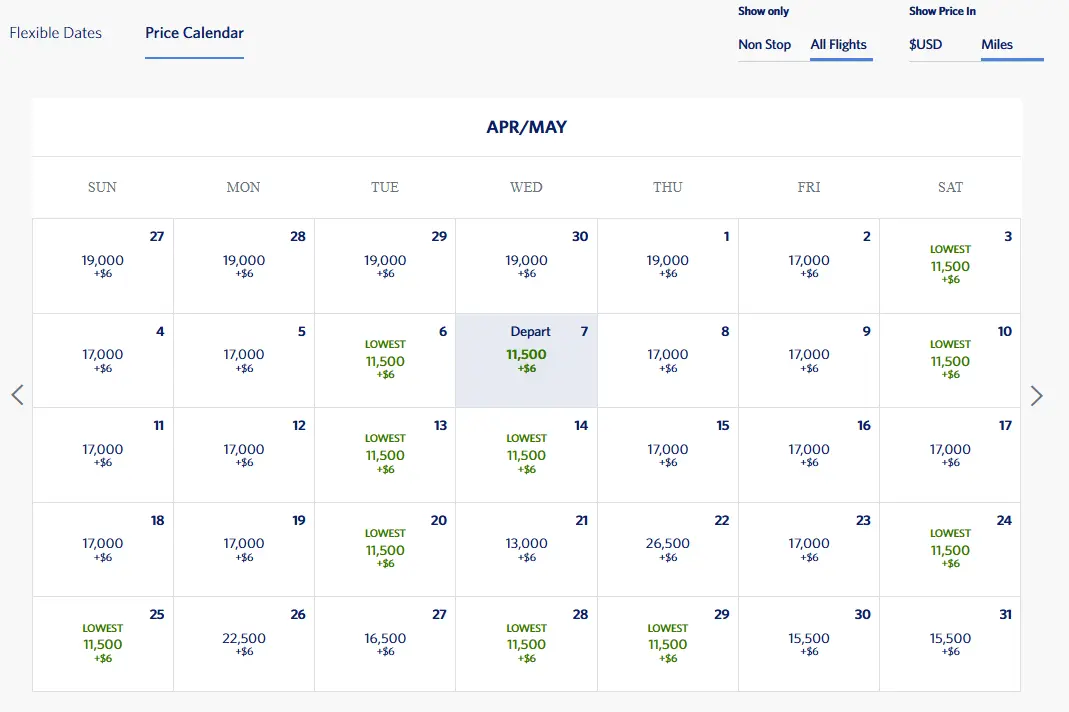
Generally, these SkyMiles are worth around 1-1.3 cents per point. This even applies to business class flights, hence why people call the currency SkyPesos. However, there are 4 ways to get more out of SkyMiles redemption.
- Delta Flash Sales: Delta can sometimes have no notice and barely advertised flash sales that will make flights incredibly cheap. The most recent flash sale included booking basic economy tickets from the US to Europe for 20,400 SkyMiles round-trip. This also stacks with the Take Off 15 mentioned below to get a round trip price of 17,340 SkyMiles. Do keep in mind that I have been tracking prices for a while and US to Europe basic economy flights have generally clocked in at around 32,000 SkyMiles round-trip from the east coast. These deals are often only found in SkyMiles Award Deals, where they typically advertise a low fare coming up in the next 2 or so months. Keep in mind the dates they advertise may not be the only dates, as bookings farther out can also be just as cheap.
-
Take Off 15: All Delta credit card holders (except for Delta SkyMiles blue card)
will get a 15% discount on Delta operated awards. This
could bring the average value of flight awards to 1.3-1.5 cents per point. For domestic
flights, this isn't too bad. This is also a discount,
so you would only need the amount that they ask you to on screen.
- Fuel Surcharges: Delta does not pass on fuel charges to your award ticket. This is most important for when you look at flights from partner airlines, which usually passes on fees to their own members.
- Free Changes and Cancellation: Probably the best thing about Delta awards is the ability to freely change and cancel tickets if not in Basic Economy. This allows for a lot of flexibility to book backup flights with.
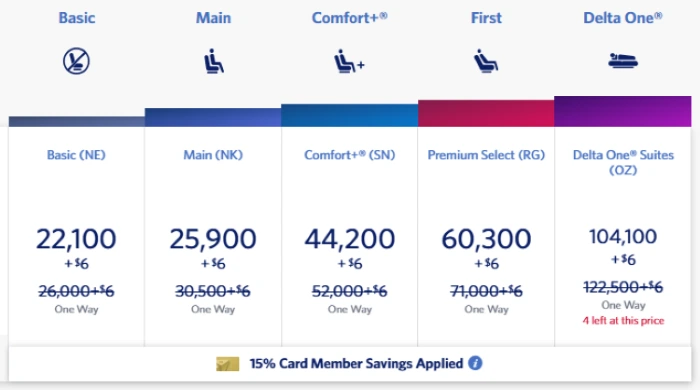
Partner Flight
Delta has a wide selection of partners that SkyMiles can be redeemed. The
best way to redeem SkyMiles for outsized value is
to redeem on partner flights that don't originate or end in the United States or Canada.
That is
because Delta has a
hidden award chart for
those flights.
To summarize the article, some of the sweetspots include Europe to Australia in business for
90,000 SkyMiles, WestJet economy within the continental United States and Canada for 12,500
SkyMiles, and East Asia to Southeast Asia in business for 40,000 SkyMiles.
While other blogs have touted the value of using SkyMiles on WestJet, I have found that
WestJet flights are in fact dynamic, so proceed with caution.
As of February 2025, I could only find availability for the following carriers. Do keep in
mind
that availability could change at any time, but
interestingly, all Chinese SkyTeam carriers are absent.
- AeroMexico
- Air France
- China Airlines
- EL AL
- Garuda Indonesia
- Hawaiian Airlines
- ITA Airways
- KLM
- Korean Air
- Latam Airlines
- Middle Eastern Airlines
- Saudia Airlines
- SAS
- Tarom
- Vietnam Airlines
- Virgin Atlantic
- WestJet
Flight Upgrades
Upgrades for flights generally cost around 1 cent per SkyMile to the cash upgrade price.
Fixed Point Costs
Delta has a few options that SkyMiles cost are directly tied to the cash price:
- Premium Drinks at SkyClub: 1.5 cents per SkyMiles for drink purchases at SkyClubs. Good value!
- Cash and Miles Flights: Book flights at 1 cent per SkyMile in 5000 SkyMiles or $50 increments. Take Off 15 would not apply to this redemption.
- Delta Vacations: Book Delta vacation packages (flight + hotel, or flight + car rental) at 1 cent per SkyMile.
Other Options
For more information, visit Delta's website.
Delta Elite Status
Medallion Requirements
Delta has 4 tiers of status for their medallion members.

Medallion Qualifying Dollars (MQD) are Delta's metric for how valuable a member is. Below are the ways to earn MQDs with Delta:
- Flights: 1 MQD per dollar spent on paid flights other than in basic economy.
- Award Flights: 1 MQD per 100 SkyMiles spent on award flights other than in basic economy.
- Exception Fares: Flights booked through vacation packages or consolidator fares will earn MQD based on distance (in miles) flown.
- Partner Flights Paid partner flights, with the SkyMiles number attached, can earn MQD based on distance flown. Partners may have different MQD earning rates.
- Credit Cards: 1 MQD per $10 spent on American Express Delta Personal and Business Reserve Card. 1 MQD per $20 spent on American Express Delta Personal and Business Platinum Card. In addition, each Delta credit Card (personal and business) will give 2,500 MQD each year up to 10,000 MQDs as an MQD headstart benefit.
- Promotions: Delta may run promotions to earn MQDs, such as with Delta stays, vacations and more.
Medallion Benefits
The list below are the benefits that all medallion members have. I have ranked the list in order of which perk I find to be the most valuable benefit.
- Additional free checked bags
- Complimentary Preferred Seat Selection
- Complimentary Companion Upgrades
- Sky Priority Check In
- Priority Waitlist Status
- Reclaim status
- Luggage Tags
-
Delta Vacations Savings
- $25 off on $0-$1499 of vacation purchases
- $75 off on $1500-$3999 of vacation purchases
- $125 off on $4000-$6999 of vacation purchases
- $250 off on $7000 or more of vacation purchases
The chart below summarizes the benefits that differ for each tier:
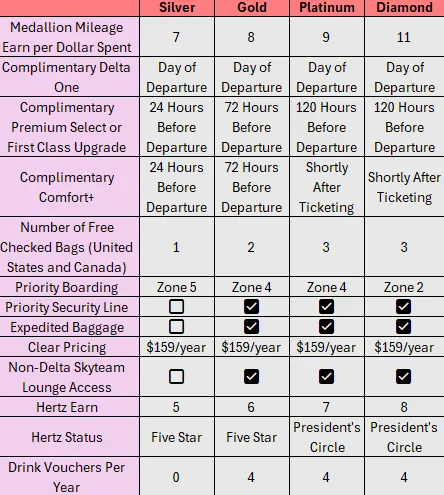
Choice Benefits
For those that reach platinum or diamond medallion, you can receive choice benefits. The options are as follows:
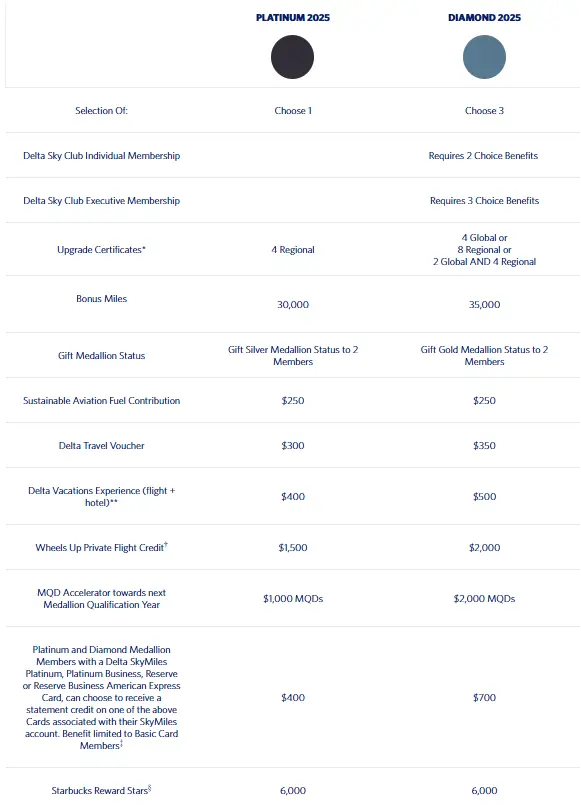
Out of all of these, my pick would be the 4 regional upgrade certificates for platinum medallion members or the 4 global upgrade certificates for the diamond medallion members. Otherwise, the rest of the benefits are in rough order of what I would personally prioritize.
Status Match
Delta offers status matches to other airline elites. Eligible airlines include:
- Air Canada
- Air New Zealand
- Alaska Airlines
- All Nippon Airways
- American Airlines
- British Airways
- Copa Airlines
- Japan Airlines
- JetBlue
- Lufthansa
- Qantas
- South African Airways
- Southwest Airlines
- United Airlines
- Virgin Australia
The requirements are a reduced number of MQD threshold to reach within 90 days for the corresponding elite status.
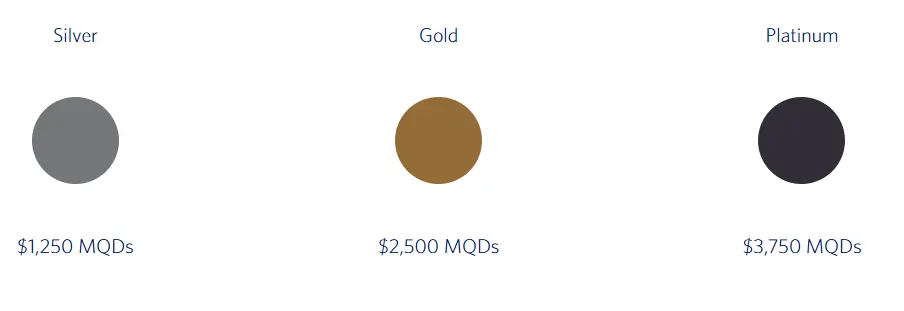
Reclaiming Status
Delta Allows for status to be reclaimed in case of life events. According to sources online, plenty of events could qualify if you call Delta. All you would have to do once approved is to reach the MQD threshold for your status, same as the status match threshold.
Million Miler
For every 1 million miles flown, Delta awards lifetime elite status. Delta counts miles flown on Delta
and partner operated flights (excluding basic economy) booked with SkyMiles or cash. Delta also
gives a gift for each million miles on top of the status. Each threshold Million miler thresholds
are as follows:
- Gold Medallion - 1 million miles
- Platinum Medallion - 2 million miles
- Diamond Medallion - 3 million miles
- Delta 360 - 5 million miles
SkyMiles Credit Cards
Delta credit cards are very powerful for those traveling on Delta. Since my home airport is
serviced the most by Delta, I
frequently fly on Delta. My personal pick is to have either the Delta Business Gold or the Delta
Business Platinum card,
due to the Delta stays credit being higher on the business cards. These two cards are what I
find to be the sweet spot in the
Delta credit card line up.
Delta SkyMiles Blue
There is not much to write home about the Delta Blue card, except that this is a $0 annual fee card. It serves as a great downgrade option for personal Delta cards.
Delta SkyMiles Gold and Delta SkyMiles Gold Business
For a $0 introductory annual fee before $150 on renewal, you can test drive the card. The card's main benefit is giving free checked bags for you and up to 8 companions and Take Off 15 (15% discount on Delta operated award flights). The $150 Delta Stays credit, especially on the business card, is a great way to offset the annual fee.
Delta SkyMiles Platinum and Delta SkyMiles Platinum Business
The main reason to hold the card instead of the Delta Gold card is the annual
2,500 MQD head start and annual companion certificate. Holding 4 Delta Platinum or Reserve (business
and/or personal) cards will automatically grant you Delta Gold Medallion status, enough to be a Skyteam Elite Plus Member
and getting access to SkyTeam partner lounges.
The companion certificate the card comes with is valid for any round trip main cabin Delta
operated flight within North America (excluding Canada) and the Caribbeans. This could
honestly represent a ton of outsized value if used correctly, sometimes even upwards of
$1000. Holding 4 Delta Platinum (personal or business) cards could automatically give you
Delta Gold Medallion status and 4 companion certificates for $1,400.
This is before factoring all the credits as well.
Delta SkyMiles Reserve and Delta SkyMiles Reserve Business
The flag ship benefit of the Delta Reserve cards are the Delta SkyClub access.
However, they are limited to 15 visits a year unless you spend $75,000 that year. Since the
American Express Platinum card also provides 6 SkyClub visits a year, for the casual Delta flyers, I
would recommend holding the American Express Platinum card instead.
However, the other flagship perk is that the card can get the most MQD for spend,
at a rate of 1 MQD per $10. The card is the best for those wishing to spend towards status.
Lastly, for all the ballers flying in first class, the annual companion certificate has the
same restrictions as the Delta Platinum companion certificates, except it also allows for
bookings in first class.